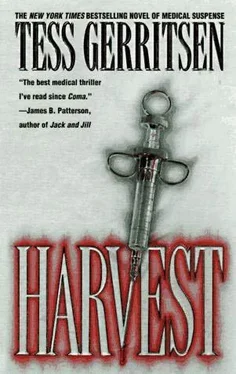"Lubi made lamb dumplings for supper. I ate nine of them."
"Don't talk about it."
"Aren't you hungry?"
"Of course I'm hungry. But I'm too sick to eat."
Yakov sighed and looked around the cabin. There were eight bunk beds in the room, and six of them were occupied by boys too ill to play. Yakov had already visited the adjoining quarters and found the other boys equally incapacitated. Would it be this way all across the Atlantic?
"It's all because of your inner ear," saidYakov. "What are you talking about?" moaned Aleksei. "Your ear. It's making your stomach sick."
"My ears are fine."
"You've been sick four days now. You've got to get up and eat."
"Oh, leave me alone."
Yakov grabbed Shu-Shu and yanked it away. "Give him back!" wailed Aleksei. "Come and get him."
"Just give him back!"
"First you get up. Come on."Yakov scurried away from the bunk as Aleksei made a futile swipe for the stuffed dog. "You'll feel better if you're out of bed."
Aleksei sat up. For a moment he huddled at the edge of his mattress, his head swaying with every tilt of the ship. Suddenly he clapped his hand to his mouth, lurched to his feet, and scrambled across the room. He vomited into the sink. Groaning, he crawled back into his bunk.
Solemnly, Yakov handed back Shu-Shu.
Aleksei hugged the stuffed dog against his chest. "I told you I was sick. Now go away."
Yakov left the boys' quarters and wandered into the corridor. At Nadiya's stateroom door, he knocked. There was no answer. He moved on to Gregor's stateroom and knocked again.
"Who is it?" came a growl.
"It's me. Yakov. Are you still sick as well?"
"Get the fuck away from my door."
Yakov left. He wandered around the ship for a while, but Lubi had retired for the night. The captain and the navigator were too busy to talk to him. As usual Yakov was on his own.
He went down to visit Koubichev in the engine room.
They set up the chessboard. Yakov drew the first move, pawn to king four.
"Have you ever been to America?" Yakov asked over the rumble of the pistons.
"Twice," said Koubichev, moving his queen's pawn forward. "Did you like it there?"
"Wouldn't know. They always order us confined to quarters as soon as we get into port. I never see a fucking thing."
"Why does the captain order this?"
"The captain doesn't. It's those people in the aft cabin."
"What people? I've never seen them."
"No one ever does."
"Then how do you know they're there?"
"Ask Lubi. He cooks for them. Someone's eating the food he sends up. Now are you going to move a piece or what?"
With great concentration, Yakov advanced another pawn. 'why don't you just leave the ship when we get there?" he asked.
'why would I?"
"To stay in America and get rich."
Koubichev grunted. "They pay me enough. I can't complain."
"How much do they pay you?"
"You're too nosy."
"Is it a lot?"
"It's more than I used to make. More than a lot of men make. And just to go back and forth, back and forth across this damned Atlantic."
Yakov moved out his queen. "So it's a good job? To be a ship's engineer?"
"That's a stupid move, bringing out your queen. Why did you make it?"
"I'm trying new things out. Should I be a ship's engineer some day?"
"No."
"But you get paid a lot."
"It's only because I work for the Sigayev Company. They pay very well."
'why?"
"I keep my mouth shut."
"Why?"
"How the hell should I.know?" Koubichev reached across the board. "My knight takes your queen. See, I told you it was a stupid move."
"It was an experiment," saidYakov.
"Well, I hope you learned something from it."
A few days later, on the bridge Yakov asked the navigator: "What's the Sigayev Company?"
The navigator shot him a look of surprise. "How did you hear that name?"
"Koubichev told me."
"He shouldn't have."
"So you don't talk about it either," saidYakov.
"That's right."
For a moment, Yakov didn't say anything. He watched the navigator fuss with his electronics equipment. There was a small screen where little numbers kept flashing, and the navigator would write the numbers in a book, then look in his chart.
'where are we?" asked Yakov.
"Here."The navigator pointed to a tiny x on the chart. It was in the middle of the ocean.
"How do you know?"
"By the numbers. I read them on the screen. The latitude and longitude. See?"
"You have to be very clever to be a navigator, don't you?"
"Not so clever, really." The man was moving two plastic rulers across the chart now. They were connected by hinges, and he'd clack them together as he slid them to the compass rose at the edge of the chart.
"Are you doing something illegal?" askedYakov.
'what?"
"Is that why you're not supposed to talk about it?"
The navigator sighed. "My only responsibility is to guide this ship from Riga to Boston and back to Riga."
"Do you always carry orphans?"
"No. Usually we carry cargo. Crates. I don't ask what's in them. I don't ask questions, period."
"So you could be doing something illegal."
The navigator laughed. "You are a little devil, aren't you?" He began to write again in his notebook, recording numbers in neat columns.
The boy watched him for a while in silence. Then he said, "Do you think anyone will adopt me?"
"Of course someone will."
"Even with this?" Yakov raised his stump of an arm. The navigator looked at him, andYakov recognized the flicker of pity in the man's eyes. "I know for a fact someone will adopt you," he said.
"How do you know?"
"Someone's paid for your passage, haven't they? Arranged for your papers."
"I've never seen my papers. Have you?"
"It's none of my business. My only job is to get this ship to Boston." He waved Yakov aside. "Why don't you go back to the other boys? Go on."
"They're still not feeling well."
"Well, go play somewhere else."
Reluctantly Yakov left the bridge and went out on deck. He was the only one there. He stood by the rail and stared down at the water splintering before the bow. He thought of the fish swimming somewhere below in their grey and turbid world, and suddenly he found he couldn't breathe; the image of swirling water was suffocating. Yet he didn't move. He stayed at the rail gripping,it with his one hand, letting the panicky thoughts of cold, deep water wash through him. Fear was something he had not felt in a very long time.
He was feeling it now.
She had had the same dream two nights in a row. The nurses told her it was because of all the medications she'd been taking. The methylprednisolone and the cyclosporine and the pain pills. The chemicals were scrambling her brain. And after weeks of hospitalization, of course she'd be having bad dreams. Everyone did. It was nothing to worry about. The dreams would, eventually, fade away.
But that morning, as Nina Voss lay in her ICU bed, the tears fresh in her eyes, she knew the dream would not go away, would never go away. It was part of her now. Just as this heart was part of her.
Softly, she touched her hand to the bandages on her chest. It had been two days since the operation, and though the soreness was just starting to ease, it still awakened her at night, a reminder of the gift she'd received. It was a good, strong heart. She had known that within a day of the surgery. During the long months of her illness, she'd forgotten what it was like to have a strong heart. To walk without gasping for air. To feel the blood pump, warm and vital, to her muscles. To look down at her own fingers and marvel at the rosy flush of her capillaries. She had lived so long waiting for death, accepting death, that life itself had become foreign to her. But now she could see it in her own hands. Could feel it in her fingertips.
Читать дальше












